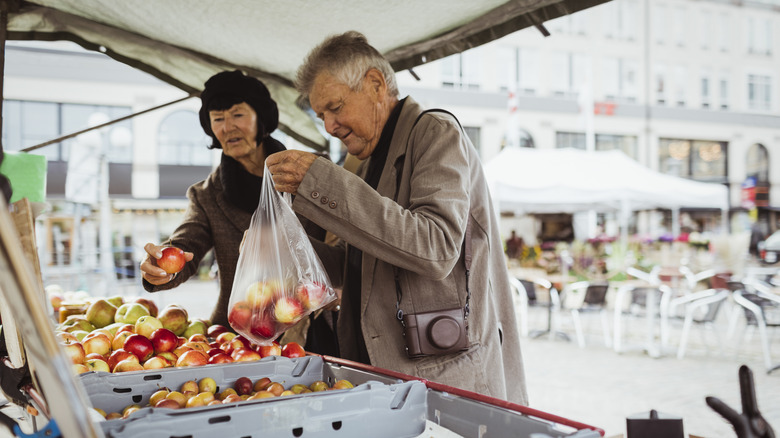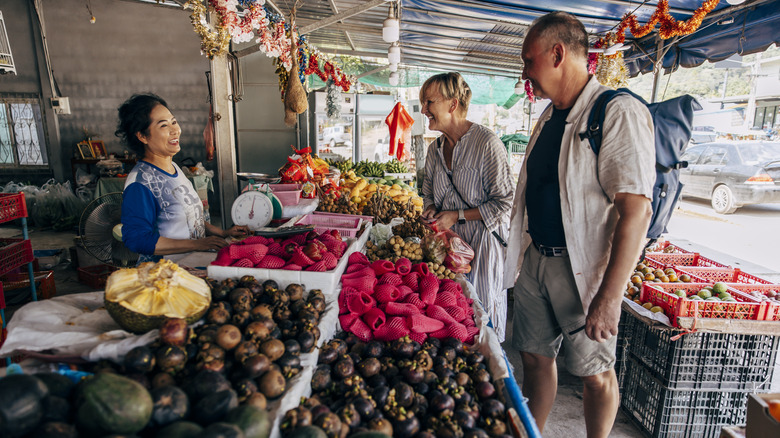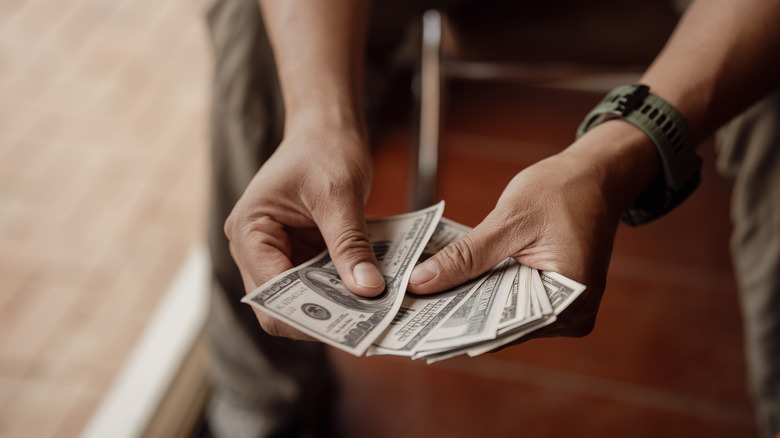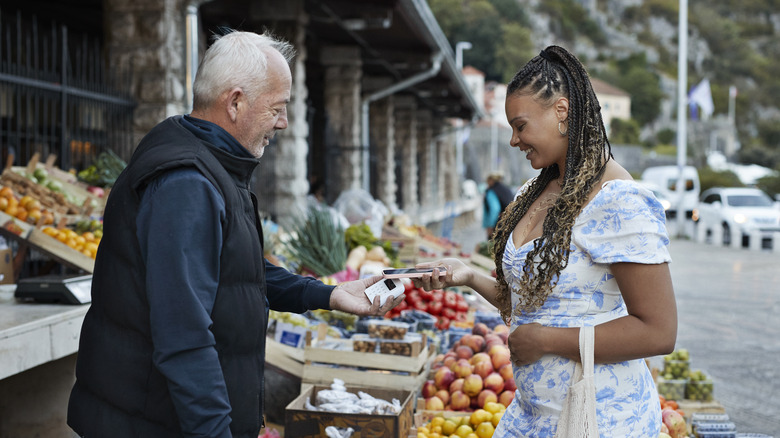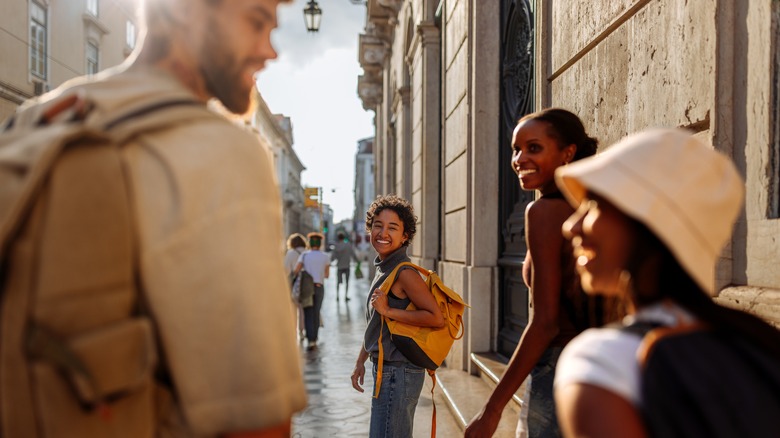Rick Steves' 15 Best Haggling Tips To Score Prices Like A Local
Every traveler is on high alert for the best deals when abroad, yet many fail to master the art of haggling. While negotiating an item's cost is taboo in the United States, it's a common practice in many places across the globe. Instead of representing the final sales prices, the number on the tag is the starting point for negotiation. Whether you're heading out to a local market or arming yourself for future trips, Rick Steves' bargaining playbook can help you score the best deal like a local.
The famed travel expert has always encouraged travelers to go off the beaten path, explore independently, and immerse themselves in the local culture. What better way to put this travel ethos into practice than engaging in a historic pastime? These actionable haggling tips aren't random tidbits. They represent the most effective strategies for intrepid travelers who enjoy the dance of negotiation, sharpened through decades of real, around-the-world experience.
Determine where haggling is acceptable
Context is everything when it comes to bargaining on vacation. Before you start undercutting a merchant's listed price, you should make sure haggling is appropriate in that particular venue. According to both Rick Steves and Fodor's, a leading provider of travel guides, prices are generally flexible along the European Mediterranean and in many developing countries throughout Latin America, Africa, Asia, and the Middle East. However, there's nuance to where haggling is acceptable, even in countries where the practice is standard. As Steves explains, prices are generally fixed at shopping malls, modern stores, and high-end streets with luxury clothing brands.
For example, your quibbling will likely be met with odd stares and smirks along Champs-Élysées in Paris or Oxford Street in London. As a rule of thumb, if the shopping experience feels similar to the U.S., consider bargaining a no-go. On the other hand, characteristically local venues — markets, street vendors — are often appropriate places to negotiate. If you're unsure but yearning to know, ask a travel agent, fellow tourists, or even a local. When in doubt, go ahead and haggle. You'd hate to make one of the major money mistakes while traveling by not negotiating when it's acceptable.
Find out what locals are paying
U.S. tourists have two factors working against their efforts to secure local deals: Merchants tend to inflate prices for travelers, and foreigners often assume Americans are wealthy. That means locals are getting the best prices while vagabonds are hit with a tourist tax. You can help level the playing field by figuring out what the locals are paying for your intended souvenir or product. Whether you're in a market, bazaar, or store, hang around until you see a local check out or consult with a local friend to get the insider scoop, Rick Steves points out.
If you don't have a contact on the ground and the language barrier is too high to overcome, break out the translator to assist your price discovery. Unless you want to risk being misunderstood and losing out on a deal, don't use just any translation app. According to the French National Centre for Scientific Research, DeepL is by far the most reliable translator, achieving a 40% score on the Bilingual Evaluation Understudy. The app has a built-in text-to-speech feature, allowing you to communicate seamlessly without having to trip over difficult pronunciation or mystery letters that don't exist in the English language.
Know what you're willing to pay
At the end of the day, value is subjective. Haggling is a perfect reflection of that reality. Steves recommends not even looking at the price tag. Cutting the sales price by half might feel like a steal to you, but the merchant might still be locking in a major profit margin. With the conversion rate in the back of your mind (if paying in local currency), pick a price point that makes the most sense to you, Rick Steves says. From here, you can start negotiating with the reassurance that you're not going above your predetermined value. A Yale report indicates that setting a personal budget is a crucial step to avoid overspending.
Just as a seller knows their minimum selling price from the onset, buyers should have a maximum offer before starting the negotiation. Knowing how much you're willing to pay for a product gives you a reliable backstop, equipping you with additional confidence when bargaining. Going in blind to your price ceiling puts you at risk of spending more than a product is worth or blowing your budget.
Talk out loud when shopping
In tourism hotspots, some shops could easily see hundreds, if not thousands, of gawking tourists scrambling by without a real intention to purchase anything. For example, vendor stalls around the Parthenon are passed by 23,000 tourists a day, and those encircling the Eiffel Tower see seven million annually. In other words, the overwhelming majority of visitors don't end up buying anything. You can use this standard aloofness to your advantage when trying to land a bargain by signaling your intention to buy something.
Talking out loud while you're shopping (instead of whispering to your travel companions or keeping it in your head) can help catch the attention of merchants. It shows your willingness to spend money if the price is right while encouraging the seller to approach you, putting the onus on them to start the negotiations. A simple "I love this hat" could do the trick. To kickstart the bargaining right away, you could comment on the price, such as "Whoa, this is expensive." The key, according to Rick Steves, is to communicate to a shop owner that you're a potential sale without being the one to initiate the actual conversation.
Conceal your excitement
Speaking out loud can move you closer toward a bargain deal, but saying the wrong things can work against you, as well. Showing too much excitement gives the merchant an upper hand by revealing a strong desire, suggesting a willingness to pay more than an item might be worth. Think of haggling like a high-stakes blackjack game: You're the gambler and the merchant is the casino. You want to give away as little as possible. That includes your level of excitement and attachment to the desired product, Rick Steves says.
You can get the information you want without showing your hand by asking for the prices of multiple items. This way, you're not singling out a favorite. Wandering around the store is another effective way to keep your enthusiasm under wraps without the merchant thinking you're another passerby. Never underestimate the power of walking away, either. Many people will drop prices significantly on the spot if they think a potential buyer is headed out, or worse, to another store. Many touristy shops sell similar items, so there's a good chance the hilarious postcard, cute scarf, or handmade bowl is available at other places around the corner.
Bring in your back up
Americans are at an automatic disadvantage when haggling abroad. A merchant who grew up in a culture where bargaining is the norm and with decades of experience besting tourists is going to have the upper hand. Calling in backup can help tilt the balance of power back in your favor. This is especially important if you're up against more than one shop owner. A partner will boost your confidence while keeping the exchange relaxed and low-key. This can also provide a needed second opinion on a product, in case you suffer from impulse buying syndrome.
Rick Steves recommends using a local friend, guide, or contact who can remove the normal tourist barriers and cut straight to the best possible price. Even your budget-conscious travel companion who makes a virtue out of saving money could help you score a better deal than if you were flying solo.
Show off your local knowledge
Right or wrong, Americans have earned a reputation abroad for being unknowledgeable and even inconsiderate about foreign countries, assumptions that translate into a tourism surcharge at local shops. According to the Pew Research Center, knowledge about foreign affairs varies greatly across the American public based on who is answering the question. A powerful way to tear through these stereotypes while striking a better deal is to be more informed than the average tourist. Brushing up on local customs, learning about the country's history, and even memorizing a few words in the local language can go a long way in securing better deals.
Reading a quick Wikipedia article or watching a documentary on the country you're visiting will give you a launching point to discuss relevant topics. For the language angle, pick up a few basics – such as "hello," "good morning," or "how are you" by downloading a language learning app or using a translator app. If you're an avid reader, consider grabbing a book about the country's history, culture, or cuisine. Make sure to focus on an area in which you have a genuine interest. The whole idea is to acquire some local knowledge to bridge the gap with locals to establish that you're not the standard tourist.
Buy a bunch of stuff
Bulk purchases aren't only a dealmaker at Costco and other U.S.-based wholesalers. This strategy also works when looking to score a deal across the pond. Instead of piecemealing your souvenir shopping, Rick Steves notes that buying a bunch of stuff from a single merchant can open the door for serious discounts. Sellers are often more likely to negotiate prices for customers purchasing multiple items, since they're motivated to increase their average spend-per-customer. You'll save yourself from having to run around to different stores and haggle with various owners, all while cutting down on your overall costs.
An analysis by LendingTree found that consumers can save around 27% when buying in bulk. With this approach, it quite literally pays to do all your shopping in one place. If you're not planning to purchase enough to trigger cost-saving deals, convince some of your friends to join you. The merchant won't care how many people are joining in on the bulk-buying. As far as they're concerned, the more the merrier. Just make sure you pitch the offer to a shop that has a lot of the souvenirs you want.
Ask to pay in cash
Credit card usage is on the rise in Europe, partially fueled by the massive influx of American consumers, 80% of whom use plastic over cash for daily transactions. This increasing acceptance of credit cards can actually work to your advantage when trying to get the most bang for your buck. Rick Steves suggests that offering to pay in cash can give you considerable leverage over the final price tag, since merchants end up paying between 2% and 3% in transaction fees.
In fact, Steves uses cash as much as possible when traveling. To avoid exorbitant exchange rates, the travel legend recommends withdrawing cash from a local ATM where you're traveling rather than exchanging dollars after you land. Be sure to check with your bank to see if you'll pay withdrawal fees in foreign countries. If you do pay with a credit card, he advises refusing the dynamic currency conversion when paying the bill.
Offer to pay everything you have
Merchants will always assume tourists can spend more on an item, which is partially why they're so good at haggling. You can turn the negotiating tables by offering to pay with "everything you have" on you. Whether it's true or not, saying you'll hand over everything on your person in exchange for an item is a proven haggling technique. It puts the bargaining ball in the merchant's court, taking the pressure off yourself and forcing them to decide right away if the price is worth it. You might want to reserve this strategy for when you have a predetermined budget or a limited amount of cash on hand.
Shop owners may be understandably reluctant to believe you don't have a few extra dollars to pay for a travel trinket. You can make the offer more believable by holding out the amount of money you want to spend or opening up your wallet or pockets to demonstrate that it's all you have at the time. This technique is most effective when used at stalls or stores where only cash is accepted, as it's tougher to believe an international traveler doesn't have sufficient savings or credit to buy a souvenir.
Physically display your payment method
Another of Rick Steves' tried and true haggling tips is to physically show your payment method. If you're in a safe location or in a country where petty crime isn't an issue, presenting the cash or card you want to use can speed up the transaction in your favor. Store owners are used to travelers partaking in the haggle ritual without planning to spend money, so you can prove your intention by showing the payment in hand.
This is a closing bargaining technique to nudge the price down a little bit further than a merchant seems willing to go. You should only break it out towards the end of the negotiating process. Taking out your wallet and removing cash or a credit card tells the shop owner you're close to striking a deal. If the gesture doesn't seem to move the needle in the negotiation, secure your payment methods to keep yourself from becoming a target and to avoid coming across as rude.
Get the lowest quoted price
If a store owner doesn't seem to be budging on the price or the haggling is taking longer than you want, asking for the lowest possible price is a reliable, no-nonsense method for moving things along. There's research suggesting that original sales prices can hinder negotiations by acting as an anchoring bias — causing people to rely too strongly on the first piece of information while ignoring other relevant details about a topic.
According to the Negotiation and Conflict Management Research journal, it's well-documented that the first price offered in a negotiation heavily impacts the outcome. Sellers often use this phenomenon against consumers by setting prices higher than their ideal price point. Asking for the lowest figure resets the conversation, reducing the impact of the original quoted price. This proactive step demonstrates you're serious about purchasing while also showing you're not going to put up with inflated prices.
Respect the unwritten rules
Even though you're reading some of Rick Steves' best haggling tips, there's no official bargaining rulebook. Instead of following clear rules or official standards, negotiating across the world moves to the rhythm of local cultures, norms, and practices. It's precisely this ambiguity and blurriness that prevent even experienced travelers from hammering out a middle-ground price. To navigate this grey area successfully, Steves recommends adhering to the basic unwritten rules that underlie nearly all haggling encounters the world over. Sticking to these basics should knock the final price down a few pegs.
First and foremost, Steves encourages travelers to be patient. Finding the best offer requires a lot of give and take. It's not something to be rushed. Secondly, you should ensure you're dealing with someone who has the authority to bend the price downward. You don't want to go behind an owner's back or waste time trying to convince someone without the leverage to change the price. Another unspoken stipulation is maintaining a respectful and friendly tone. Even where haggling is the accepted standard, people still engage civilly and courteously. Don't make insultingly low offers, and don't mistake stern prices for disrespect. Keep things light-hearted. Finally, Steves points out that "you must buy the item ... if a merchant accepts your price."
Practice, practice, and practice more
Haggling while traveling is doubly awkward. Not only are Americans unaccustomed to pushing back on a listed sales price, but you're doing it in a foreign country. Different customs and a language barrier only add to the strangeness. If you have enough time on your trip, practicing your negotiation skills can go a long way in making you more comfortable and improving your chances of landing bargains like a local. You're not going to be a dealmaker maestro from the get-go, but even a handful of interactions can give you an idea for local norms, realistic price ranges, and other intangibles of negotiation.
A smart way to approach it is by gradually building up your exposure to the haggling process. Begin by simply asking merchants for the prices of different items, then toss in some pushback, such as requesting the best deal or politely saying you think the price is too high. With every interaction, you should be prolonging the conversation, getting more aggressive in your counters, and becoming more comfortable with the interaction overall. You don't have to wait until you're on the road to practice your haggling. Having a friend or partner simulate a bargaining interaction can work wonders. The Journal of Palliative Medicine suggests that roleplaying helps equip people with the skills required to partake in challenging conversations in the real world.
Be prepared to walk away
You should never feel compelled to buy something, no matter how long you've been haggling with a store owner. In countries where negotiating is the status quo, merchants have the back-and-forth baked into their business model. They'll only entertain your offers as long as it feels worthwhile financially and time-wise. Most vendors you come across have decades of experience dealing with tourists, giving them a sixth sense of sorts when it comes to sniffing out when a negotiation is a bust or a buy. Keep in mind that only 20% of people who visit brick-and-mortar stores end up making a purchase.
This is even higher for tourism nerve centers where countless tourists are walking around aimlessly. Not only are these merchants not expecting to convert every patron, but they also understand that shopping around is part of a vacation. They deal with potentially hundreds of foreigners a week. Besides, walking away doesn't shut the door on negotiations. You can always come back to the same location. Furthermore, heading out of the store is one of the most powerful negotiating tactics, since it shows the seller you have no problem walking away. You might just strike a last-minute deal before you make it out the door.
